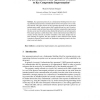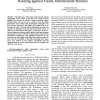68 search results - page 9 / 14 » How to Prevent Type Flaw Attacks on Security Protocols |
EUROPKI
2006
Springer
13 years 10 months ago
2006
Springer
Abstract. Key agreement protocols are a fundamental building block for ensuring authenticated and private communications between two parties over an insecure network. This paper fo...
WISEC
2010
ACM
13 years 7 months ago
2010
ACM
Physical-layer identification of wireless devices, commonly referred to as Radio Frequency (RF) fingerprinting, is the process of identifying a device based on transmission imperf...
SP
2009
IEEE
14 years 1 months ago
2009
IEEE
In this paper, we study the degree to which a genomic string, Q, leaks details about itself any time it engages in comparison protocols with a genomic querier, Bob, even if those ...
CCS
2006
ACM
13 years 10 months ago
2006
ACM
In this paper, we introduce the concept of witness anonymity for peer-to-peer systems. Witness anonymity combines the seemingly conflicting requirements of anonymity (for honest p...
NOMS
2006
IEEE
14 years 22 days ago
2006
IEEE
— The importance of the routers in the network and the vulnerability in the nature of the link state routing protocol highlight the necessity of effective routing protection agai...


